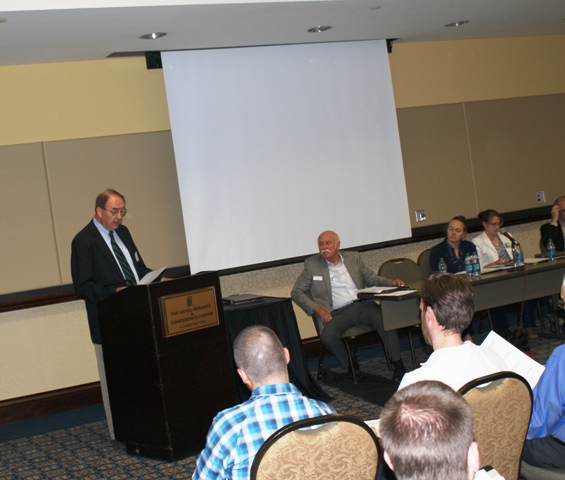
The seventh annual Statewide Land Conservation Conference in Virginia, held over a two-day period in Roanoke last week, was a chance for those interested in preserving land to check their scorecards. “The future of land conservation …is yours to direct,” said Chuck Roe of the Land Trust Alliance, before he introduced former Roanoke City Councilman Rupert Cutler.
Cutler, who also led some of the attendees on a bird watching trip along the Lick Run Greenway (he spotted his 91st bird species in the process), was a founding board member for the Western Virginia Land Trust, based in Roanoke, and the original executive director of Explore Park. Cutler asked those he spoke to at Hotel Roanoke to consider a number of “fundamental questions” when it comes to protecting land via conservation easements or outright purchases.
What are Virginia’s greatest conservation needs? How can they be met? How does land conservation get financed? Those were some of the questions posed by Cutler, who proposed a far-reaching summit where many players would come up with an action plan. “Lets think big,” said Cutler, “I challenge you.”
Others that took part in a panel discussion said big summits often don’t produce anything but a report that gets filed, proposing instead that looking for private donors to finance land conservation was a more viable option. Phil Hocker, with Conservation Service Company LLC, said that overall, “we are actually doing remarkably well [in Virginia],” in crafting conservation easements that preserve pristine tracts from development.
Hocker was most vocal in pushing private philanthropy as a way to protect land: “the reliance on public funding is a recent phenomenon.” In fact, said Hocker, the tax credit that accompanies easements – where homeowners hold on to property but give up development rights – was only approved by the IRS in 1964. As for relying on a steady stream of public funds to protect land, “I don’t think that’s gonna work,” noted Hocker.
Cutler sees a balance between public and private funding nonetheless, citing an act signed by President Kennedy in the early ‘60’s to fund land acquisition. Cutler, who once worked in the Carter administration, said it has never been adequately funded. He’d like to see that change. Virginia is doing “better than average,” said Cutler; the Virginia Outdoors Foundation, a state agency, holds more conservation easements than any other land trust in the country. “There are a lot of needs that still [must] be addressed,” he warned.
Gerald McCarthy agreed with Cutler that having a master plan in place is a good idea, “but sooner or later that plan has to be implemented.” Action plans to save land from development are imperative, said McCarthy: “the default position in this county is to develop, not to conserve.”
McCarthy agreed with Hocker, that seeking private donors with deep pockets for funds to help preserve land for future generations was “a good place to look.” He worried that despite being written in to the state constitution, there seemed to be very little “mindset” among the politicians in Richmond concerning the importance of conserving land.
The Blue Ridge Land Conservancy in Roanoke (formerly the Western Virginia Land Trust), hosted the two-day conference at Hotel Roanoke. “It gives people involved in land conservation from all over the state…a perspective on what’s possible, what can be done,” said executive director David Perry.
A majority of Virginians support land conservation, according to Perry, adding that Virginia has the “most generous” tax credits for conservation easements in the U.S. The Commonwealth was fifth overall in the country in the number of acres conserved, according to a recent survey that looked at a five-year period. “[And] we’re number one in the Southeast – we feel quite proud of our accomplishments in light of rapid development in many areas of the state.”
Perry said about 50,000 acres of farmland are lost every year in Virginia to development. “Its very important that we preserve these lands – while they are there.” The Kaine administration set aside 400,000 acres before the ex-Governor-turned Senator left office. Current governor Bob McDonnell has been hamstrung somewhat by the economy said Perry, but he hears there may be a big push coming for land conservancy before the Republican leaves office next year.
Perry said reaction to his organization’s new name has been positive. “The faces are the same – [and] nobody knew what Western Virginia was.” In fact they were often confused with a land conservancy group from Charleston, West Virginia. “It’s been a breath of fresh air for the organization.”
By Gene Marrano

